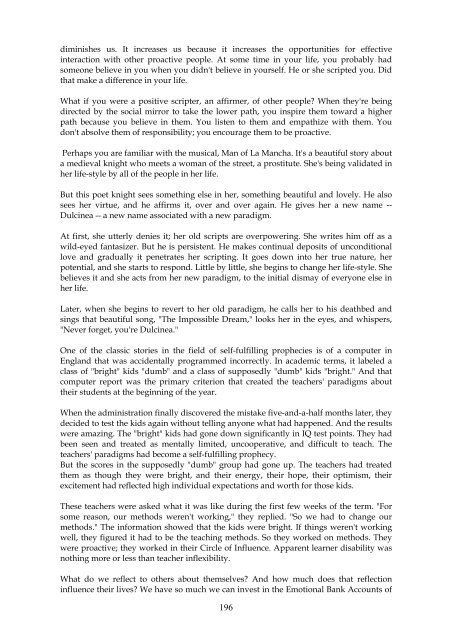Covey - The 7 habits of highly effective people
Create successful ePaper yourself
Turn your PDF publications into a flip-book with our unique Google optimized e-Paper software.
diminishes us. It increases us because it increases the opportunities for <strong>effective</strong><br />
interaction with other proactive <strong>people</strong>. At some time in your life, you probably had<br />
someone believe in you when you didn't believe in yourself. He or she scripted you. Did<br />
that make a difference in your life.<br />
What if you were a positive scripter, an affirmer, <strong>of</strong> other <strong>people</strong>? When they're being<br />
directed by the social mirror to take the lower path, you inspire them toward a higher<br />
path because you believe in them. You listen to them and empathize with them. You<br />
don't absolve them <strong>of</strong> responsibility; you encourage them to be proactive.<br />
Perhaps you are familiar with the musical, Man <strong>of</strong> La Mancha. It's a beautiful story about<br />
a medieval knight who meets a woman <strong>of</strong> the street, a prostitute. She's being validated in<br />
her life-style by all <strong>of</strong> the <strong>people</strong> in her life.<br />
But this poet knight sees something else in her, something beautiful and lovely. He also<br />
sees her virtue, and he affirms it, over and over again. He gives her a new name --<br />
Dulcinea -- a new name associated with a new paradigm.<br />
At first, she utterly denies it; her old scripts are overpowering. She writes him <strong>of</strong>f as a<br />
wild-eyed fantasizer. But he is persistent. He makes continual deposits <strong>of</strong> unconditional<br />
love and gradually it penetrates her scripting. It goes down into her true nature, her<br />
potential, and she starts to respond. Little by little, she begins to change her life-style. She<br />
believes it and she acts from her new paradigm, to the initial dismay <strong>of</strong> everyone else in<br />
her life.<br />
Later, when she begins to revert to her old paradigm, he calls her to his deathbed and<br />
sings that beautiful song, "<strong>The</strong> Impossible Dream," looks her in the eyes, and whispers,<br />
"Never forget, you're Dulcinea."<br />
One <strong>of</strong> the classic stories in the field <strong>of</strong> self-fulfilling prophecies is <strong>of</strong> a computer in<br />
England that was accidentally programmed incorrectly. In academic terms, it labeled a<br />
class <strong>of</strong> "bright" kids "dumb" and a class <strong>of</strong> supposedly "dumb" kids "bright." And that<br />
computer report was the primary criterion that created the teachers' paradigms about<br />
their students at the beginning <strong>of</strong> the year.<br />
When the administration finally discovered the mistake five-and-a-half months later, they<br />
decided to test the kids again without telling anyone what had happened. And the results<br />
were amazing. <strong>The</strong> "bright" kids had gone down significantly in IQ test points. <strong>The</strong>y had<br />
been seen and treated as mentally limited, uncooperative, and difficult to teach. <strong>The</strong><br />
teachers' paradigms had become a self-fulfilling prophecy.<br />
But the scores in the supposedly "dumb" group had gone up. <strong>The</strong> teachers had treated<br />
them as though they were bright, and their energy, their hope, their optimism, their<br />
excitement had reflected high individual expectations and worth for those kids.<br />
<strong>The</strong>se teachers were asked what it was like during the first few weeks <strong>of</strong> the term. "For<br />
some reason, our methods weren't working," they replied. "So we had to change our<br />
methods." <strong>The</strong> information showed that the kids were bright. If things weren't working<br />
well, they figured it had to be the teaching methods. So they worked on methods. <strong>The</strong>y<br />
were proactive; they worked in their Circle <strong>of</strong> Influence. Apparent learner disability was<br />
nothing more or less than teacher inflexibility.<br />
What do we reflect to others about themselves? And how much does that reflection<br />
influence their lives? We have so much we can invest in the Emotional Bank Accounts <strong>of</strong><br />
196


